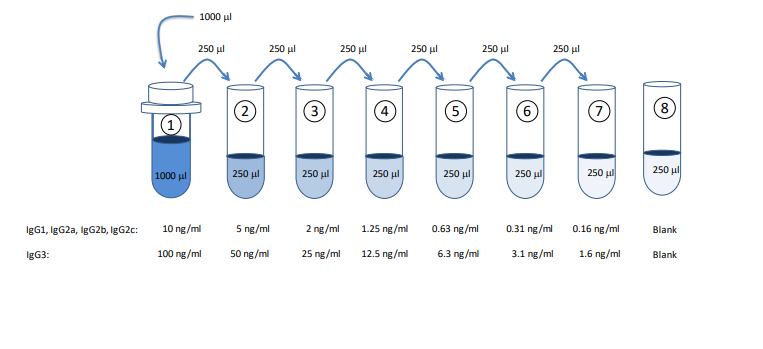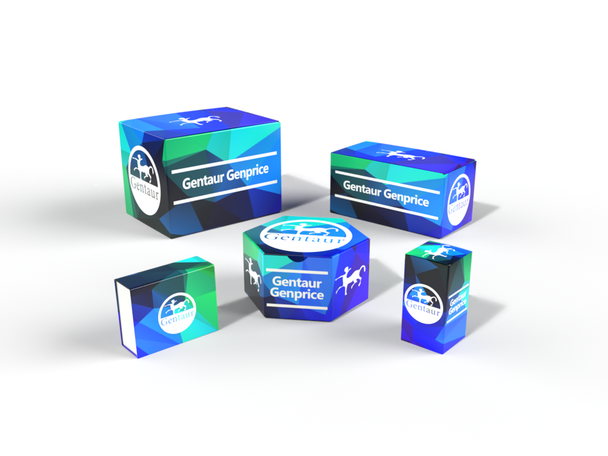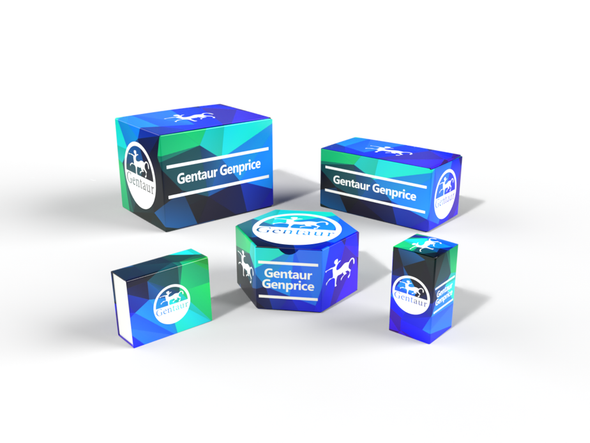445
Mouse Anti-Mouse Type II Collagen IgG1 Subtype Antibody Assay Kit, TMB
- SKU:
- 445-20361T-GEN
- Availability:
- IN STOCK
Description
Mouse Anti-Mouse Type II Collagen IgG1 Subtype Antibody Assay Kit, TMB - Cat Number: 20361T From .
Research Field: Arthritis, Immunology
Clonality: N/A
Cross-Reactivity:
Host Origin: N/A
Applications: N/A
Isotype: N/A
Detection Range: 10 ng/ml-0.16 ng/ml
Sample Type: Serum, Plasma
Concentration: N/A
Immunogen:
DESCRIPTION: Assay kit to quantify mouse anti-collagen antibodies
FORMAT: Pre-coated 96-well ELISA Plate with removeable strips
ASSAY TYPE: Indirect ELISA
ASSAY TIME: 4.25 hours
STANDARD RANGE: IgG1, IgG2a, IgG2b, and IgG2c : 10-0.16 ng/ml
IgG3 : 100-1.6 ng/ml
NUMBER OF SAMPLES: Up to 39 (duplicate) samples/standard plate (will vary for custom kits)
SAMPLE TYPES: Serum and Plasma
RECOMMENDED SAMPLE DILUTIONS: 1:1000 (at least)
CHROMOGEN: TMB (read at 450 nm)
STORAGE: -20°C
VALIDATION DATA: N/A
INTRODUCTION
Autoantibodies to type II collagen play a primary role in the collagen induced arthritis (CIA) model. However, autoantibodies are not always capable of inducing arthritis due to the inability to activate a complement, the first critical step in the activation of inflammatory cascades. In CIA susceptible DBA mice, complement fixable IgG2a and IgG2b subtype autoantibody levels, as well as their epitope specificity, are pertinent in the induction of arthritis. In order to adequately study the pathological roles of antibodies to type II collagen, it is important to determine individual IgG subtype autoantibody levels to mouse type II collagen as well as the heterologous type II collagen used for immunization. On the other hand, C57BL/6 mice, a popular strain for developing transgenic mice, produce IgG2c antibodies instead of IgG2a antibodies due to its MHC class I haplotype (H-2b). Moreover, these mice can only develop CIA when immunized with chick type II collagen. Therefore, serum IgG2c autoantibody levels against mouse type II collagen and chick type II collagen should be evaluated when using
C57BL/6 mice for the CIA model. , Inc.
provides Mouse Anti-Collagen IgG Antibody Subtype (IgG1, IgG2a, IgG2b, IgG2c, and IgG3) ELISA Kits for further analysis of antibodies in mouse serum from the mouse CIA model. Depending on the IgG subtypes and epitopes, the antibody-antigen affinity varies significantly among individual antibodies and serum samples from individual animals. Therefore, the total IgG concentration calculated as the sum of individual IgG subtypes might not perfectly match the total IgG levels determined by , Inc’s Mouse Anti-Collagen IgG ELISA Kit. These kits can also be used to determine antibody levels to type I collagen (chick, bovine, porcine, human, and mouse) upon request. Please contact , Inc. at support@.com for more information on custom type I collagen-coated plates.
KIT COMPONENTS
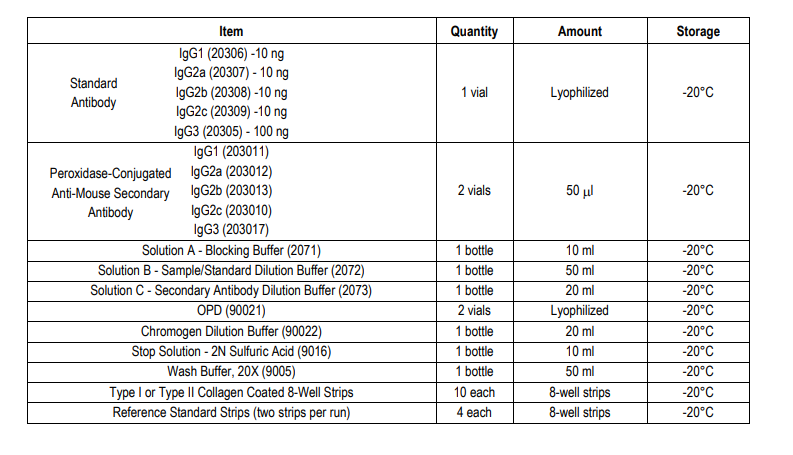
PLATE COATING AND SETUP
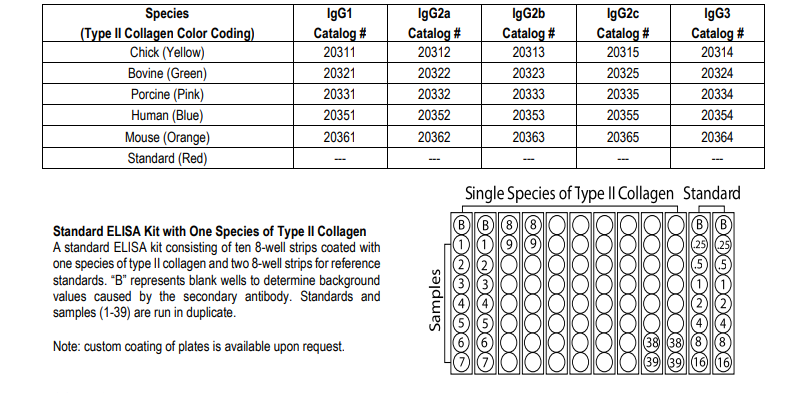
ASSAY OUTLINE
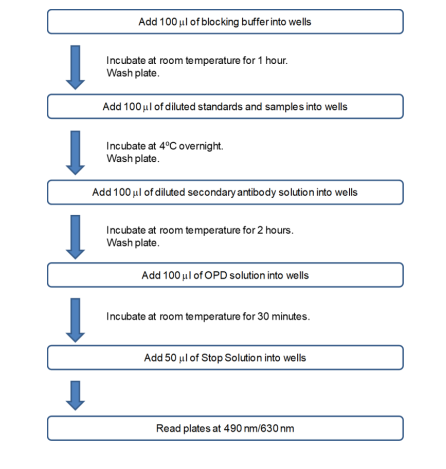
NOTES BEFORE USING ASSAY
NOTE 1: It is recommended that the standard and samples be run in duplicate.
NOTE 2: Warm up all buffers to room temperature before use.
NOTE 3: Crystals may form in Wash Buffer, 20X when stored at cold temperatures. If crystals have formed, warm the wash buffer by placing the bottle in warm water until crystals are completely dissolved.
NOTE 4: Measure exact volume of buffers using a serological pipet, as extra buffer is provided.
NOTE 5: Cover the plate with plastic wrap or a plate sealer after each step to prevent evaporation from the outside wells of the plate.
NOTE 6: For partial reagent use, please see the assay protocol’s corresponding step for the appropriate dilution ratio. For example, if the protocol dilutes 50 µl of a stock solution in 10 ml of buffer for 12 strips, then for 6 strips, dilute 25 µl of the stock solution in 5 ml of buffer. Partially used stock reagents may be kept in their original vials and stored at -20⁰C for use in a future assay.
NOTE 7: This kit contains animal components from non-infectious animals and should be treated as potential biohazards in use and for disposa
ASSAY PROCEDURE
Add Blocking Buffer: Add 100 µl of Blocking Buffer (Solution A) to all wells. Incubate for 1 hour at room temperature.
2. Prepare Standard Dilutions: Dissolve one vial of standard with 1 ml of Sample/Standard Dilution Buffer (Solution B) to make the highest standard concentration, labeled “1” in the standard dilution diagram below. Prepare serial dilutions of the 1X standard by mixing 250 µl of the 1X standard with 250 µl of Solution B, labeled “2” in the standard dilution diagram below. Then repeat this procedure five more times to make a total of seven standard stock solutions. The 1X standard may be stored at -20°C for use in a second assay. , Inc. recommends making fresh serial dilutions for each assay.
